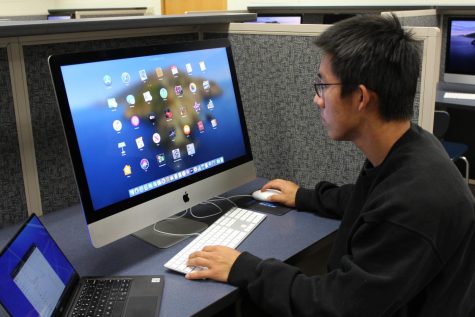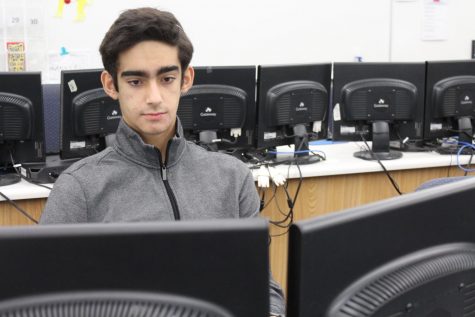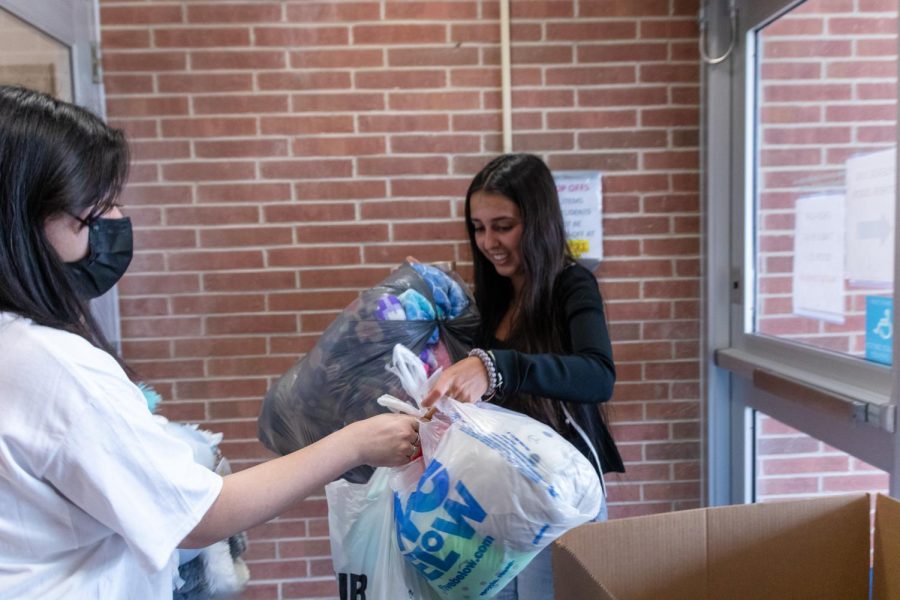After a cyberbullying incident over Instagram when she was a freshman, junior Ella Owens said she does not spend as much time online as she used to.
“I stopped caring about it so much,” Owens said. “I didn’t delete the apps, but I definitely didn’t go on them as much.”
Owens is one of many victims of a progressively increasing trend of behind-the-screens attacks. For example, a 2019 study sample from the Cyberbullying Research Center found 37% of high school students have reported being cyberbullied, with females more likely to be cyberbullied at some point in their lifetimes than other students.
Coupled with the COVID-19 pandemic and the rapid rise of TikTok and other social media platforms, cyberbullying has become more commonplace and has grown in high school communities.
 According to Assistant Principal Maureen Borto, who oversees student services, there are many factors the administration considers when addressing cyberbullying.
According to Assistant Principal Maureen Borto, who oversees student services, there are many factors the administration considers when addressing cyberbullying.
“We evaluate (disciplinary protocols) every year. We look at a lot of data in terms of what are we seeing students for here in our office, what does that look like, and then going in with that discipline that goes with it,” Borto said. “We try to educate ourselves (constantly on) being aware of what’s going on, how that’s happening. And we really focus (on encouraging) our kids to talk to someone. If something’s going on, let someone know so we can help.”
Owens said her experience with cyberbullying started when she had a disagreement with a friend. She said she often saw embarrassing pictures of herself as the profile picture of her bully’s account that she had shared in confidence and later on many fake accounts that were specifically made for the purpose of teasing her.
“It had a lot of impact,” she said. “I ended up having to leave Carmel High School and go to the (Carmel Learning Center) last year because of it. It got (to be) too much. It was just a lot for me to handle. I kind of isolated myself because of it.”
Owens said she lost all motivation to go to school and has only recently returned to CHS for her junior year. However, she said the bullying still hasn’t stopped.
“Even this year, (cyberbullying) has happened again; it’s still the same girl,” she said.
Owens also said she was not entirely pleased with the way the school administration decided to handle matters when it came to reporting false posts and keeping her safe online.
She said, “I feel like they’ve done as much as they can to prevent the accounts from going up, from taking them down, but they don’t really do a good job actually addressing the issue and the person behind all of it; they kind of look at it like, ‘Oh (the accounts are) not there anymore,’ and she’ll do it again, and they’ll have to take it down again. It’s become like a cycle, but they’re doing a good job taking the (posts) down.”
 According to Borto, however, the administration’s hands can often be tied in such situations due to restrictions on what they can discipline students for.
According to Borto, however, the administration’s hands can often be tied in such situations due to restrictions on what they can discipline students for.
“The biggest thing is, when we’re looking at (cyberbullying), we’re going to step in on two accounts: one is if we can help the students resolve that, to help them learn how to interact with each other,” she said. “The other thing we look at is, ‘When does it become a disruption of the learning environment?’ So that’s when we can also look to take action on something. And that’s a broad term, ‘disruption to the learning environment.’”
This all stems from the 1969 Supreme Court case Tinker v. Des Moines, in which students sued the school district after they were suspended for wearing armbands to protest the Vietnam War. In the end, the Supreme Court decided the students were justified in their silent protest and that school administrations can only address or ban student expression––which not only includes clothing but also speech and content such as cyberbullying––if it causes “substantial disruption” to the academic environment. This often means that school organizations as a whole often cannot address acts such as cyberbullying if they do not sufficiently disturb the school setting.
But beyond punishment, some students like senior Adrien Qi said maintaining a safe digital persona can help keep students protected from facing cyberbullying in the first place.

Qi, co-leader of CyberPatriots, a cybersecurity club, said, “Cybersecurity is important because obviously a lot of our companies, (and people) in the United States around the world store (money and information) online. Not only money, there (are corporate) secrets or business secrets that are stored online that need to be protected. And even on a personal level, you don’t want your information to be stolen, so it should be protected.”
Qi also said the school has helped to encourage cybersecurity standards for students through devices like the Wi-Fi root certificate which helps keep online information safe.
Qi’s CyberPatriot teammate, sophomore David Racovan, said he agreed.
Racovan said while measures taken by the school were good in essence, students must also take steps to protect their information in as many ways as possible. He said he wanted more people to learn about the basics of cybersecurity, as he said the effects otherwise could be adverse.

He said, “(The effects can include) data breaches, which are never fun, and lead to significant, possibly monetary losses or different kinds of identity theft, intellectual property loss. For normal users, they could also have identity theft, they may have threats against, which is called being doxxed online, so everyone should keep a good cybersecurity hygiene, when they are interacting with others online especially.”
Owens said she has a vision for cybersecurity where everything has to go through a checkpoint before being posted online. This rings similar to renewed calls for Facebook’s Oversight Board and other social media company’s regulators to increase their moderation of controversial and potentially offensive posts.
Owens also said it was incredibly important for students to speak up if they were being cyberbullied.
Borto said she agreed.
“Anytime (you) think something’s going on, whatever, talk to anyone. Talk to someone, let us know, and we can work with (you) to help,” she said. “If (you) see something that just gives (you) pause, come and see us.”



















![Joseph Broman, Mu Alpha Theta sponsor, grades tests for his honors precalculus/trigonometry class. Broman said, “I’m retiring from the Math Club next year and I’m just going to do Mu Alpha Theta so I can focus on that one and we can do more [speaker series] first semester.”](https://hilite.org/wp-content/uploads/2024/03/IMG_9502-1200x900.jpg)











![British royalty are American celebrities [opinion]](https://hilite.org/wp-content/uploads/2024/03/Screenshot-2024-03-24-1.44.57-PM.png)




















![Review: “The Iron Claw” cannot get enough praise [MUSE]](https://hilite.org/wp-content/uploads/2024/04/unnamed.png)
![Review: “The Bear” sets an unbelievably high bar for future comedy shows [MUSE]](https://hilite.org/wp-content/uploads/2024/03/unnamed.png)
![Review: “Mysterious Lotus Casebook” is an amazing historical Chinese drama [MUSE]](https://hilite.org/wp-content/uploads/2024/03/0.webp)
![Thea Bendaly on her Instagram-run crochet shop [Biz Buzz]](https://hilite.org/wp-content/uploads/2024/03/IMG_0165-1200x838.jpg)
![Review: Sally Rooney’s “Normal People,” is the best book to read when you are in a time of change [MUSE]](https://hilite.org/wp-content/uploads/2024/03/20047217-low_res-normal-people.webp)
![Review in Print: Maripaz Villar brings a delightfully unique style to the world of WEBTOON [MUSE]](https://hilite.org/wp-content/uploads/2023/12/maripazcover-1200x960.jpg)
![Review: “The Sword of Kaigen” is a masterpiece [MUSE]](https://hilite.org/wp-content/uploads/2023/11/Screenshot-2023-11-26-201051.png)
![Review: Gateron Oil Kings, great linear switches, okay price [MUSE]](https://hilite.org/wp-content/uploads/2023/11/Screenshot-2023-11-26-200553.png)
![Review: “A Haunting in Venice” is a significant improvement from other Agatha Christie adaptations [MUSE]](https://hilite.org/wp-content/uploads/2023/11/e7ee2938a6d422669771bce6d8088521.jpg)
![Review: A Thanksgiving story from elementary school, still just as interesting [MUSE]](https://hilite.org/wp-content/uploads/2023/11/Screenshot-2023-11-26-195514-987x1200.png)
![Review: When I Fly Towards You, cute, uplifting youth drama [MUSE]](https://hilite.org/wp-content/uploads/2023/09/When-I-Fly-Towards-You-Chinese-drama.png)
![Postcards from Muse: Hawaii Travel Diary [MUSE]](https://hilite.org/wp-content/uploads/2023/09/My-project-1-1200x1200.jpg)
![Review: Ladybug & Cat Noir: The Movie, departure from original show [MUSE]](https://hilite.org/wp-content/uploads/2023/09/Ladybug__Cat_Noir_-_The_Movie_poster.jpg)
![Review in Print: Hidden Love is the cute, uplifting drama everyone needs [MUSE]](https://hilite.org/wp-content/uploads/2023/09/hiddenlovecover-e1693597208225-1030x1200.png)
![Review in Print: Heartstopper is the heartwarming queer romance we all need [MUSE]](https://hilite.org/wp-content/uploads/2023/08/museheartstoppercover-1200x654.png)























![Review: Ladybug & Cat Noir: The Movie, departure from original show [MUSE]](https://hilite.org/wp-content/uploads/2023/09/Ladybug__Cat_Noir_-_The_Movie_poster-221x300.jpg)

![Review: Next in Fashion season two survives changes, becomes a valuable pop culture artifact [MUSE]](https://hilite.org/wp-content/uploads/2023/03/Screen-Shot-2023-03-09-at-11.05.05-AM-300x214.png)
![Review: Is The Stormlight Archive worth it? [MUSE]](https://hilite.org/wp-content/uploads/2023/10/unnamed-1-184x300.png)



